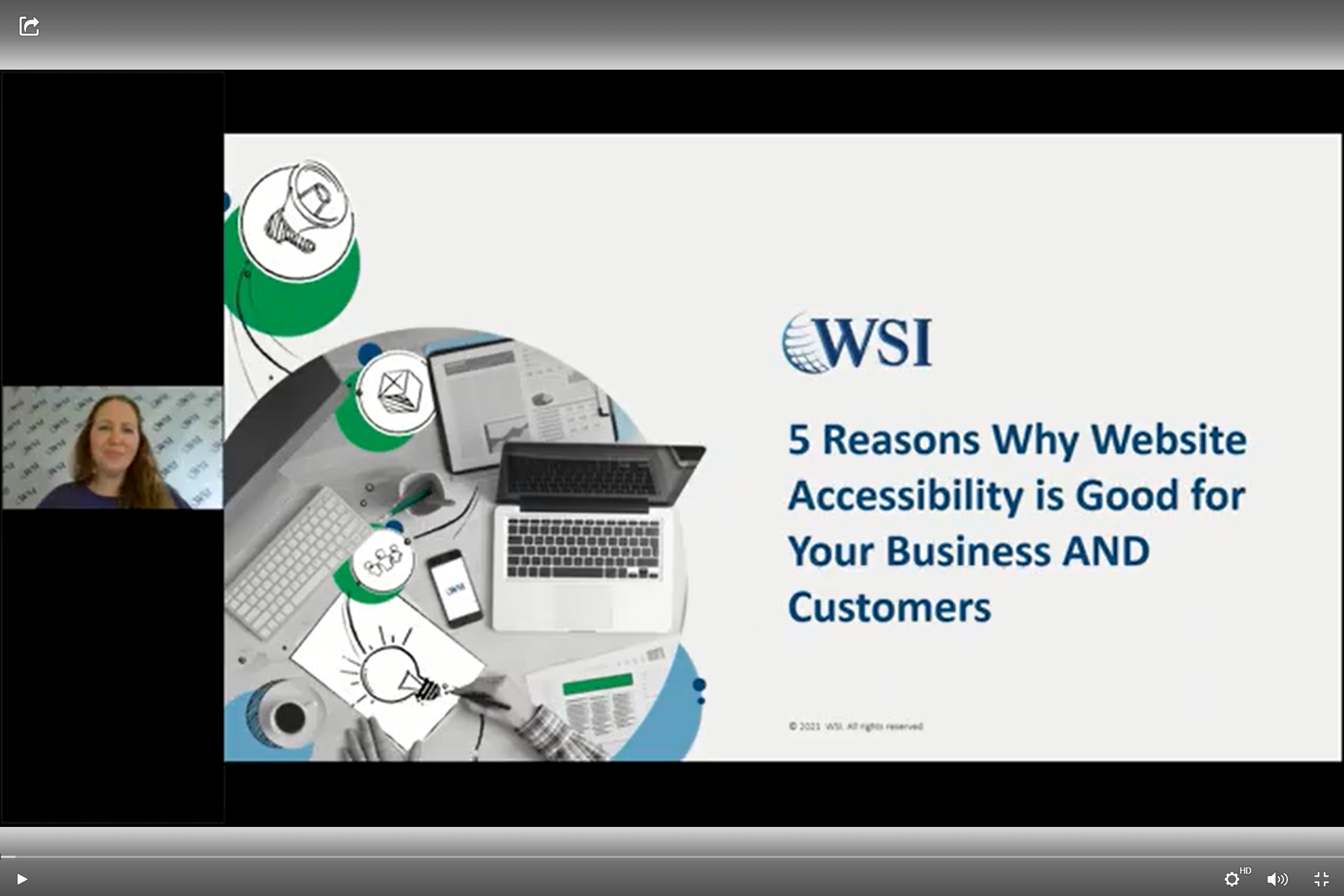RECAP: 5 Reasons Why Accessibility is Good for Your Business

Summary: Do you want to be an inclusive business and increase sales? Then you’re in the right place! In this post, you will realize why website accessibility is good for your business and customers.
For over 25 years, WSI has been providing digital marketing services and strategies – including website accessibility checklists – to businesses of all sizes and across various industries.
Our webinar host and WSI Digital Marketing Consultant, is Eric Cook, MBA, a “recovering banker”, award-winning web designer, and three-time contributing author to Digital Minds: A Strategic Approach To Connecting And Engaging With Your Customers Online.
What Is Website Accessibility?
The official definition, from W3C’s Web Accessibility Initiative, is: “Web accessibility means that websites, tools, and technologies are designed and developed so that people with disabilities can use them.”
Bearing in mind that each of these has its own nuances, these are some categories of disabilities:
- Auditory: Do you have closed captioning on your videos?
- Cognitive: Does your website rely on big blocks of text?
- Neurological: Do you have an alternative to flashing and light pulses on your videos?
- Physical: Can your website be navigated via the keyboard?
- Speech: As voice search is gaining popularity, do you provide non-verbal options?
- Visual: Is there enough contrast for those who are color blind?
Not only do individuals with some form of disability benefit, but there are also additional non-disability advantages. Input modes for devices with small screens, less mobility due to ageing, short-term disabilities such as a broken bone or misplaced specs, environmental limitations such as bright light, poor internet connection and/or bandwidth.
Why is Website Accessibility Important?
The statistics answer this question best:
- 15% of the world’s population has some form of disability.
- That currently translates to 56.7 million Americans, 80 million people in the European Union, and 20% of Australians that have a disability.
- Of that, 1 – 3% of the global population and around 6.5 million Americans have an intellectual disability, while 74.6 million have a physical disability.
- 59.6% of the U.S. population with disabilities were living in a household with internet access.
- 23% of disabled respondents say they “never” go online.
- By 2060 the number of seniors (65+ years old) could double to 98 million.
Keeping these figures in mind will motivate you to make the changes necessary to make your website and other digital interactions accessible. Refer to these stats in meetings and as part of a (digital) paper trail.
Another reason why website accessibility is important is to avoid being on the receiving end of an accessibility lawsuit. With so much more reliance on online-only trading during COVID-19, digital accessibility lawsuits have increased by 50% over the last two years. To avoid being one of the ten new lawsuits filed every day, your website includes appropriate accessibility specifications, guidelines, practices.
Top tip: Working in such a dynamic environment makes it essential that your digital stays abreast of trends and technologies.
Elements Impacting Website Accessibility
These are the elements you will need to address:
- Content: The information on a web page or web application (text, images, sound, code, or markup).
- User agents: Web browsers, tablets, watches, media players, and so forth.
- Assistive technology: Screen readers, braille translation services, alternative keyboards, etc that collects website data from the backend of the code and restates that to the user.
- The user: The experiences, knowledge and limitations, and a depth of strategies to using the web.
- Developers: Designers, coders, and authors should include developers with disabilities and users who can contribute content.
- Authoring tools: Software that creates websites to open up career possibilities for employees as well as caring for customers.
- Evaluation tools: Accessibility evaluation tools, HTML validators, CSS validators, and so on. Provide guidance by highlighting areas that need to be rectified. (Get in touch with your friendly WSI agency for assistance accessing these critical tools.)
The Five Benefits of Having an Accessible Website Revealed
- Reduce your legal risk of an ADA-related lawsuit. Compelling, but hopefully not your sole reason for remediation.
- Improve your search engine optimization. SEO relates to communication between the browser and search engines to consume content.
- Improve your overall user experience. Although some things may be implemented specifically for users with disabilities, your able-bodied users might end up preferring them too.
- Position your brand as one that values inclusivity. Proactively acknowledge, support, and serve people with all levels of ability.
- Reach a larger customer audience representing billions in spending power. Exposure to a larger consumer audience also leads to additional revenue streams.
Top tip: Don’t forget your third-party partners, e.g. scheduling or reservations service, an app platform, or shopping cart. You cannot contract away your accessibility responsibility or liability!
Recommendations and Next Steps
Start by leveraging available technology such as Audioeye.
Then, for a quick guide to get you started, get your hands on WSI’s 90-Day Accessibility Checklist. Here are some best practices from it:
- Document research and conversations.
- Get your website tested.
- Enlist the help of a digital marketing professional.
- Put a website accessibility plan together.
- Maintain and review it periodically.
Reach out to your WSI Consultant for the best digital marketing results and expert assistance with increasing your website accessibility.
And don’t forget, you can catch up on all the details we shared above in our latest Client Webinar: 5 Reasons Why Website Accessibility is Good for Your Business AND Customers.
About the Author
Rick spent 20 years in the insurance industry in finance, primarily developing reporting platforms for B & C stakeholders. His ability to speak to consumers of data (managers and analysts) and translate their needs to programmers led him to start his own digital marketing agency in 2004 to develop data driven solutions for business owners.
The Best Digital Marketing Insight and Advice
We are committed to protecting your privacy. For more info, please review our Privacy and Cookie Policies. You may unsubscribe at any time.
Don’t stop the learning now!


